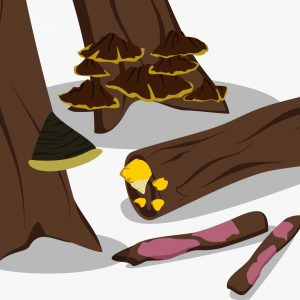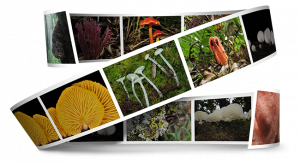The Initiative
MIND.Funga aims to answer scientific questions that lead us to develop short and long-term research, especially in poorly explored and threatened areas. For that, we use an integrative approach (taxonomy, molecular phylogeny, ecology, metagenomics, etc.) in our studies with macro and microfungi.

In general, our interest groups are wood-decay fungi, such as polypores (Polyporales, Hymenochaetales), which play an important role in maintaining natural ecosystems, and Cordyceps sensu lato (Hypocreales), a fantastic group of entomopathogenic organisms that use insects to develop part of their life cycle. The research group seeks to understand the fungal communities associated with plants (endophytes) and soil, in order to understand the ecology and the real magnitude of fungal diversity in these ecosystems. Furthermore, when carrying out expeditions in poorly explored and threatened areas, such as altitude ecosystems (e.g. Cloud Forest), we have been finding and studying an enormous diversity of macrofungi, including lichens, both in Basidiomycota and Ascomycota.

Most of our studies are systematic, using molecular, morphological, and ecological characters. In that sense, we use phylogenetic analyzes as a tool to understand the evolutionary history of different lineages and the taxonomic delimitation of species.
On the other hand, we are also interested in the importance of fungi in ecological processes, the influence of climate change on the fungal community, and its conservation. In addition, in order to permeate the non-scientific community, we are carrying out Citizen Science projects, where the communities around Conservation Areas have an opportunity to understand the importance of fungi by joining efforts with researchers in the recognition of species richness.
In addition, in order to permeate the non-scientific community, we are carrying out Citizen Science projects, where the communities around Conservation Areas have an opportunity to understand the importance of fungi by joining efforts with researchers in the recognition of species richness.
Another important front that permeates all lines of execution is Scientific Education. The launching of a children’s book available for free in ebook format and delivered printed to public elementary schools is an important contribution by MIND.Funga for the popularization of fungi among citizens in formation, helping in the recognition of Funga and its importance for our lives. Still on the Scientific Education front, the application for species recognition, which is being developed by MIND.Funga, can be used in practical classes by teachers. MIND.Funga also works in Scientific Communication, generating diversified content about Funga and science from the group’s social networks, helping to form knowledge about fungi in the general public.
Our activities:
1) Research in unique and threatened ecosystems (Cloud Forests, for example) in order to study a particular Funga.
2) Inventories of fungi and plants, recording the distribution of species and their conservation status.
3) Resolution of taxonomic complexes and description of new taxa.
4) Recognition and monitoring fungal communities in different vegetation formations (plants and soils).
5) Development and use of digital tools that assist in the identification of macrofungi, as well as in the popularization and basic and higher education.
6) Dissemination of scientific news and curiosities related to fungi.








